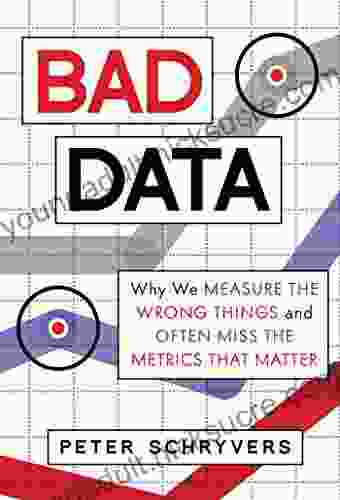Why We Measure the Wrong Things and Often Miss the Metrics That Matter: A Comprehensive Analysis

In the realm of business, data reigns supreme. Companies invest heavily in collecting and analyzing metrics in the fervent hope of gaining insights that will drive success. However, despite our best efforts, we often find ourselves measuring the wrong things and missing the metrics that truly matter. The result is a blurred understanding of our performance and a misguided path to improvement.
The Pitfalls of Measuring the Wrong Things
Why do we measure the wrong things? The reasons are manifold and deeply ingrained in our organizational structures and mindsets.
4.6 out of 5
| Language | : | English |
| File size | : | 1215 KB |
| Text-to-Speech | : | Enabled |
| Screen Reader | : | Supported |
| Enhanced typesetting | : | Enabled |
| X-Ray | : | Enabled |
| Word Wise | : | Enabled |
| Print length | : | 338 pages |
- Incentive Systems: We tend to measure what is easy to measure and what aligns with our current incentives. This can lead us to prioritize vanity metrics that look good on paper but fail to capture the true essence of our performance.
- Data Availability: Our measurement choices are often constrained by the data that is readily available. This can result in a narrow focus on easily accessible data, even if it provides incomplete or misleading insights.
- Historical Legacy: Organizations often inherit measurement practices from the past, continuing to track metrics that may have been relevant in a previous era but have lost their significance over time.
- Hype and Buzz: We can be swayed by popular trends and buzzwords, leading us to adopt metrics that are fashionable but not necessarily relevant to our specific business needs.
- Confirmation Bias: We tend to seek out and measure data that confirms our existing beliefs. This can create a self-fulfilling prophecy where we continually reinforce our biases and miss opportunities for improvement.
The Cost of Misalignment
Measuring the wrong things comes at a steep cost. It can:
- Misguide Decision-Making: Decisions made on the basis of irrelevant or incomplete data can lead to poor outcomes and wasted resources.
- Create a False Sense of Progress: Tracking vanity metrics can create an illusion of improvement, masking underlying problems.
- Impede Innovation: A focus on lagging indicators can stifle innovation and prevent us from adapting to changing market conditions.
- Undermine Employee Motivation: Tracking metrics that are not aligned with employee goals can demotivate teams and erode trust.
- Waste Time and Resources: Collecting and analyzing irrelevant data is a drain on time and resources that could be better spent on value-adding activities.
Identifying the Metrics That Matter
To avoid the pitfalls of measuring the wrong things, it is imperative to identify the metrics that truly matter for our organizations. This requires a thoughtful and rigorous process that involves:
- Defining Clear Objectives: Identifying the specific business goals and outcomes that we want to measure.
- Mapping Metrics to Objectives: Matching relevant metrics to each objective, ensuring that the data we collect provides meaningful insights.
- Considering Leading and Lagging Indicators: Balancing the tracking of leading indicators (which predict future performance) with lagging indicators (which measure past performance) to provide a comprehensive view.
- Prioritizing Right Data Over Big Data: Focusing on collecting the right data, even if it is not readily available or easy to measure.
- Regularly Reviewing and Evolving: Continuously reviewing our metrics and making adjustments as needed to ensure they remain aligned with our changing business needs.
Examples of Meaningful Metrics
The specific metrics that matter will vary depending on the industry, organization, and specific objectives. However, some examples of meaningful metrics include:
- Customer Lifetime Value: The total value of a customer's business over their lifetime, providing insights into customer loyalty and profitability.
- Employee Engagement: The level of employee satisfaction, motivation, and commitment, which is closely linked to productivity and innovation.
- Innovation Output: The number and quality of new ideas generated and implemented, indicating the organization's ability to adapt and grow.
- Sustainable Growth: Metrics that measure the organization's environmental, social, and governance performance, ensuring long-term viability.
- Overall Business Health: A composite metric that considers a range of financial, operational, and customer-related indicators, providing a comprehensive overview of the organization's performance.
In an era where data is abundant, measuring the right things is more important than ever. By identifying the metrics that truly matter and avoiding the pitfalls of measuring the wrong things, we can gain a clearer understanding of our performance, make better decisions, and drive sustainable success for our organizations. It is time to break free from the confines of traditional measurement practices and embrace a more enlightened approach to data.
4.6 out of 5
| Language | : | English |
| File size | : | 1215 KB |
| Text-to-Speech | : | Enabled |
| Screen Reader | : | Supported |
| Enhanced typesetting | : | Enabled |
| X-Ray | : | Enabled |
| Word Wise | : | Enabled |
| Print length | : | 338 pages |
Do you want to contribute by writing guest posts on this blog?
Please contact us and send us a resume of previous articles that you have written.
 Fiction
Fiction Non Fiction
Non Fiction Romance
Romance Mystery
Mystery Thriller
Thriller SciFi
SciFi Fantasy
Fantasy Horror
Horror Biography
Biography Selfhelp
Selfhelp Business
Business History
History Classics
Classics Poetry
Poetry Childrens
Childrens Young Adult
Young Adult Educational
Educational Cooking
Cooking Travel
Travel Lifestyle
Lifestyle Spirituality
Spirituality Health
Health Fitness
Fitness Technology
Technology Science
Science Arts
Arts Crafts
Crafts DIY
DIY Gardening
Gardening Petcare
Petcare Nathaniel Rich
Nathaniel Rich Mercedes Pollmeier
Mercedes Pollmeier Carlo Rovelli
Carlo Rovelli J D Swanson
J D Swanson Jessica Wolstenholm
Jessica Wolstenholm Chuck Weikert
Chuck Weikert James M Johnston
James M Johnston George Megre
George Megre Andy Farrell
Andy Farrell William D Lopez
William D Lopez Robyn Ryle
Robyn Ryle Mark W Steege
Mark W Steege Stephen Cheney
Stephen Cheney Bradley Charbonneau
Bradley Charbonneau Joe Berardi
Joe Berardi Ed Stafford
Ed Stafford Keith Crowley
Keith Crowley Barry Pickthall
Barry Pickthall Ryan Bow
Ryan Bow Irene Gut Opdyke
Irene Gut Opdyke Lucy Postgate
Lucy Postgate Ingrid S Clay
Ingrid S Clay David Herres
David Herres Donna Mott
Donna Mott Louis Martin
Louis Martin Serena B Miller
Serena B Miller Kate Le Roux
Kate Le Roux Peter Finch
Peter Finch Angeline Boulley
Angeline Boulley Andy Schell
Andy Schell Jim Prime
Jim Prime Madeleine Roux
Madeleine Roux Dave Duncan
Dave Duncan Jennifer Bohnet
Jennifer Bohnet Alessio Mangoni
Alessio Mangoni Angelo Lowery
Angelo Lowery Gerard Siggins
Gerard Siggins Robert E Stake
Robert E Stake Marie Brennan
Marie Brennan Jeremy Klaff
Jeremy Klaff Milton Roth
Milton Roth Keith Elliot Greenberg
Keith Elliot Greenberg Karen Elliott House
Karen Elliott House Lisa Marie Mercer
Lisa Marie Mercer Jeffrey T Richelson
Jeffrey T Richelson Lee Cronk
Lee Cronk Thomas Gilovich
Thomas Gilovich Cynthia Nims
Cynthia Nims Mark Synnott
Mark Synnott Forrest Maready
Forrest Maready Dennis Rainey
Dennis Rainey Miles Olson
Miles Olson Diana Winston
Diana Winston Douglas Henderson Jr
Douglas Henderson Jr Arlin Smith
Arlin Smith Ron Jeffries
Ron Jeffries Jodi Picoult
Jodi Picoult Dan Ariely
Dan Ariely Leanne Ely
Leanne Ely Wendy Rosenoff
Wendy Rosenoff Chef Maggie Chow
Chef Maggie Chow Mark Shepherd
Mark Shepherd Andy Peloquin
Andy Peloquin Elizabeth Foss
Elizabeth Foss Mark Lester
Mark Lester Carlos Acevedo
Carlos Acevedo Ariel Henley
Ariel Henley Sir Edmund Hillary
Sir Edmund Hillary Kat Anderson
Kat Anderson Liv Ryan
Liv Ryan Beth A Leonard
Beth A Leonard Pete Dunne
Pete Dunne Warren St John
Warren St John Mitch Horowitz
Mitch Horowitz Devaki Lakshmi
Devaki Lakshmi Peter Gibson
Peter Gibson Tim Larkin
Tim Larkin Emily Nielson
Emily Nielson Kim Foley Mackinnon
Kim Foley Mackinnon Jeff Mach
Jeff Mach Lutz Hanseroth
Lutz Hanseroth Third Edition Kindle Edition
Third Edition Kindle Edition Dave Smith
Dave Smith Ashley P Martin
Ashley P Martin Angela Smith
Angela Smith Ellen Frank
Ellen Frank Joshua Clark
Joshua Clark Angelo Tropea
Angelo Tropea Sharon Strand Ellison
Sharon Strand Ellison Emily Souder
Emily Souder Richard Bate
Richard Bate Emiko Jean
Emiko Jean Joel J Lerner
Joel J Lerner Karl Beecher
Karl Beecher Margaret Jordan Halter
Margaret Jordan Halter Yvonne Choquet Bruhat
Yvonne Choquet Bruhat Rufus Estes
Rufus Estes Connie Schultz
Connie Schultz Richard A Muller
Richard A Muller Tania N Shah
Tania N Shah Christina Hillsberg
Christina Hillsberg Robin Yocum
Robin Yocum Ben Ehrenreich
Ben Ehrenreich Katrina Cope
Katrina Cope Neveen Musa
Neveen Musa Danil Zburivsky
Danil Zburivsky Tom Dymond
Tom Dymond Avinash Navlani
Avinash Navlani Jeff Fleischer
Jeff Fleischer Diana Nyad
Diana Nyad Mark J Musser
Mark J Musser Derek M Steinbacher
Derek M Steinbacher Cory Mortensen
Cory Mortensen Latonya J Trotter
Latonya J Trotter Frank Deford
Frank Deford Frederick Aardema
Frederick Aardema Angel Burns
Angel Burns Mark Kernion
Mark Kernion Nicole Smith
Nicole Smith Wynne Foster
Wynne Foster Warren Sande
Warren Sande Joyce Yang
Joyce Yang Stephen Jungmann
Stephen Jungmann David E Jones
David E Jones Andy Jurinko
Andy Jurinko Lawrence Goldstone
Lawrence Goldstone Humberto G Garcia
Humberto G Garcia Catherine Mccord
Catherine Mccord Greg Prato
Greg Prato Kelly Corrigan
Kelly Corrigan Kristina Statler
Kristina Statler Capn Fatty Goodlander
Capn Fatty Goodlander Rebecca Hemmings
Rebecca Hemmings Erich Fromm
Erich Fromm Tim Thayne
Tim Thayne Elizabeth Kaledin
Elizabeth Kaledin Joseph Mazur
Joseph Mazur Rebecca Boggs Roberts
Rebecca Boggs Roberts Bernd Heinrich
Bernd Heinrich Robert Dudley
Robert Dudley Jim Saccomano
Jim Saccomano Scott Meyer
Scott Meyer Madison Lee
Madison Lee W Todd Woodard
W Todd Woodard Richard G Brown
Richard G Brown John Samuel Barnett
John Samuel Barnett Dhonielle Clayton
Dhonielle Clayton Schoolhouse Heaven
Schoolhouse Heaven Lisa Preston
Lisa Preston Sandy Tolan
Sandy Tolan Bill Schneider
Bill Schneider Cap N Fatty Goodlander
Cap N Fatty Goodlander Cate Tiernan
Cate Tiernan Roger Craig
Roger Craig Yuu Tanaka
Yuu Tanaka Stephen Grossberg
Stephen Grossberg G K Derosa
G K Derosa Mark Verstegen
Mark Verstegen Lidia Bastianich
Lidia Bastianich Tom Allen
Tom Allen Colby Coombs
Colby Coombs Ken Dryden
Ken Dryden David C Keehn
David C Keehn Robert Kirk
Robert Kirk Jerry Toner
Jerry Toner Ryan D Agostino
Ryan D Agostino Jeffrey Lee
Jeffrey Lee Massimo Florio
Massimo Florio Shane O Mara
Shane O Mara Jay Griffiths
Jay Griffiths Kyle Graves
Kyle Graves Belinda Norton
Belinda Norton Steve Hindman
Steve Hindman Sam Bleakley
Sam Bleakley Cheryl Alkon
Cheryl Alkon Barak Ariel
Barak Ariel Robb Manning
Robb Manning Eugene P Northrop
Eugene P Northrop Bret A Moore
Bret A Moore Stuart Lawrence
Stuart Lawrence D M Davis
D M Davis Oliver Burkeman
Oliver Burkeman Gillian Price
Gillian Price Patrick Pickens
Patrick Pickens Kevin Thomas
Kevin Thomas Ruth Benedict
Ruth Benedict Kent David Kelly
Kent David Kelly Dean Beaumont
Dean Beaumont Lynn Lyons
Lynn Lyons Matthew D Dewar
Matthew D Dewar Joan Jacobs Brumberg
Joan Jacobs Brumberg Bob Clouser
Bob Clouser Samir P Desai
Samir P Desai Andy Puddicombe
Andy Puddicombe Margaret M Quinlan
Margaret M Quinlan Robin Benway
Robin Benway Chris Chelios
Chris Chelios Phil Burt
Phil Burt Bradley T Erford
Bradley T Erford Johnson Egonmwan
Johnson Egonmwan Christian Heath
Christian Heath Angela Thayer
Angela Thayer Bob Gordon
Bob Gordon Kathryn Miles
Kathryn Miles Miranda Green
Miranda Green Tovar Cerulli
Tovar Cerulli Ruby Lang
Ruby Lang Thais Nye Derich
Thais Nye Derich Kristen S Kurland
Kristen S Kurland Mirabai Starr
Mirabai Starr Dr Eva Beaulieu
Dr Eva Beaulieu Adam Skolnick
Adam Skolnick Sandra Steingraber
Sandra Steingraber Carol Ann Gillespie
Carol Ann Gillespie Alberta Hawse
Alberta Hawse Violet White
Violet White Michael V Uschan
Michael V Uschan Jeffrey Bernstein
Jeffrey Bernstein Ashley Rickards
Ashley Rickards Tiara Mcclure
Tiara Mcclure Jeffrey Thurston
Jeffrey Thurston Mark Remy
Mark Remy Daddilife Books
Daddilife Books Rebecca P Cohen
Rebecca P Cohen Siena Cherson Siegel
Siena Cherson Siegel Nick Bradley
Nick Bradley Jessica Nordell
Jessica Nordell Tina Nelson
Tina Nelson Richard L Sites
Richard L Sites Kevin J Gaston
Kevin J Gaston Linda Sivertsen
Linda Sivertsen Pete Sampras
Pete Sampras Joy Williams
Joy Williams Harold S Koplewicz
Harold S Koplewicz Emma Dalton
Emma Dalton Judith S Beck
Judith S Beck Jessica Jung
Jessica Jung Hajime Isayama
Hajime Isayama Kristen Jervis Cacka
Kristen Jervis Cacka Christopher Nyerges
Christopher Nyerges Bob Swope
Bob Swope Jane M Healy
Jane M Healy Lindsay Ford
Lindsay Ford Dawn Griffiths
Dawn Griffiths Rick Vaive
Rick Vaive Kim Dragoner
Kim Dragoner Michael Tomasello
Michael Tomasello Jay Matthews
Jay Matthews Angela Leslee
Angela Leslee Ron Douglas
Ron Douglas Nicholas Epley
Nicholas Epley Alex Wolf
Alex Wolf Donna Helen Crisp Jd Msn Rn Pmhcns Bc
Donna Helen Crisp Jd Msn Rn Pmhcns Bc Walter Beede
Walter Beede Jenna Blough
Jenna Blough Harry Fairhead
Harry Fairhead Shreya Ramachandran
Shreya Ramachandran Christina Reese
Christina Reese Martin Volken
Martin Volken Jenny Smith
Jenny Smith M J Fievre
M J Fievre K Moriyasu
K Moriyasu Johnny Molloy
Johnny Molloy Howard Davis
Howard Davis Robert Urban
Robert Urban Joe Peta
Joe Peta Tanya Lee Stone
Tanya Lee Stone Andy Dowsett
Andy Dowsett Eric Schmitz
Eric Schmitz Tovah Feldshuh
Tovah Feldshuh Meg Long
Meg Long Jason Hogan
Jason Hogan Jamie Kuykendall
Jamie Kuykendall Rodney Castleden
Rodney Castleden Lynn Palm
Lynn Palm Manik Joshi
Manik Joshi Angela Stancar Johnson
Angela Stancar Johnson Muako Maepa
Muako Maepa Jim Posewitz
Jim Posewitz Rachel Kowert
Rachel Kowert R E Burrillo
R E Burrillo Otto Rahn
Otto Rahn Wayne Mcghie
Wayne Mcghie Rod Powers
Rod Powers Angela Eckhoff
Angela Eckhoff Ben Bleiweiss
Ben Bleiweiss Donald R Prothero
Donald R Prothero Tim Hannigan
Tim Hannigan Ellen J Langer
Ellen J Langer United States Government Us Army
United States Government Us Army Rafael Gordillo Naranjo
Rafael Gordillo Naranjo Robert Lindsay
Robert Lindsay Jenna Helwig
Jenna Helwig Janet Menzies
Janet Menzies Rob Willson
Rob Willson Mike Chambers
Mike Chambers Marie Myung Ok Lee
Marie Myung Ok Lee Rodney Paul
Rodney Paul Rawdon Wyatt
Rawdon Wyatt Mary Pipher
Mary Pipher Gregory J Davenport
Gregory J Davenport John Sonmez
John Sonmez Michael Anthony
Michael Anthony Hourly History
Hourly History Matt Vincent
Matt Vincent Jordan Summers
Jordan Summers Guy Evans
Guy Evans Rosie Daley
Rosie Daley Patrick M Lencioni
Patrick M Lencioni Scott Turner
Scott Turner Angelina J Steffort
Angelina J Steffort Gary B Meisner
Gary B Meisner John Geiger
John Geiger Roland A Boucher
Roland A Boucher Tim Macwelch
Tim Macwelch Fredrik Backman
Fredrik Backman Lois A Ritter
Lois A Ritter S L Macgregor Mathers
S L Macgregor Mathers Robin Ray Green
Robin Ray Green Afra J Zomorodian
Afra J Zomorodian Caryl Say
Caryl Say Kenneth R Ginsburg
Kenneth R Ginsburg Sam Fury
Sam Fury Angela C Wu
Angela C Wu Troy A Hill
Troy A Hill Stefan Hunziker
Stefan Hunziker Germano Dalcielo
Germano Dalcielo Eliot Schrefer
Eliot Schrefer Scott Stillman
Scott Stillman John B Nici
John B Nici Chanel Craft Tanner
Chanel Craft Tanner Mandee Heller Adler
Mandee Heller Adler Teresa Parker
Teresa Parker Kathy Freston
Kathy Freston Rachel Hutt Phd
Rachel Hutt Phd Stewart Shapiro
Stewart Shapiro Stephanie Land
Stephanie Land Jonathan Gottschall
Jonathan Gottschall Peter Townsend
Peter Townsend Samuel B Green
Samuel B Green Kari Marie Norgaard
Kari Marie Norgaard Shalabh Aggarwal
Shalabh Aggarwal Jo May
Jo May Andy Crowe
Andy Crowe Margaret Visser
Margaret Visser T R Fehrenbach
T R Fehrenbach Andy Tyson
Andy Tyson Robyn Harding
Robyn Harding George Johnson
George Johnson Rebecca Eanes
Rebecca Eanes Karen Sternheimer
Karen Sternheimer Kim West
Kim West Scott Alan Johnston
Scott Alan Johnston Michele Borba
Michele Borba Christopher O Kennon
Christopher O Kennon Andrea Lankford
Andrea Lankford Rebecca Serle
Rebecca Serle Nikki Ace
Nikki Ace Michael Driscoll
Michael Driscoll Baby Professor
Baby Professor Caspar Melville
Caspar Melville Rebecca Solnit
Rebecca Solnit Dan Heath
Dan Heath Nicholas Jubber
Nicholas Jubber Stacy Mccullough
Stacy Mccullough Richard Lemaster
Richard Lemaster Angel Millar
Angel Millar Richard Lee Byers
Richard Lee Byers Elizabeth Hunter
Elizabeth Hunter Leonard Lueras
Leonard Lueras Patrick Ejeke
Patrick Ejeke Jeanne Godfrey
Jeanne Godfrey Tom Chatfield
Tom Chatfield Chris Santella
Chris Santella Sabbithry Persad Mba
Sabbithry Persad Mba Stephen Lynch
Stephen Lynch Elly Molina
Elly Molina Laura Bogen
Laura Bogen Richard Hibshman
Richard Hibshman Mometrix
Mometrix Stefanie K Johnson
Stefanie K Johnson John C Maxwell
John C Maxwell Ryan Beck
Ryan Beck Raynor Winn
Raynor Winn Keylee C Hargis
Keylee C Hargis David Kinney
David Kinney Florian Freistetter
Florian Freistetter Jonah Lehrer
Jonah Lehrer Ray Walker
Ray Walker Tim O Connor
Tim O Connor Anna Rashbrook
Anna Rashbrook William Ayers
William Ayers Judea Pearl
Judea Pearl Nicholas D Kristof
Nicholas D Kristof Andy Mitchell
Andy Mitchell William Bryant Logan
William Bryant Logan Tristan Higbee
Tristan Higbee Lin Wellford
Lin Wellford Christian Wiggins
Christian Wiggins Ted Sandling
Ted Sandling William E Hearn
William E Hearn Dwight E Neuenschwander
Dwight E Neuenschwander Marilyn Burgos
Marilyn Burgos Neil Hawkesford
Neil Hawkesford Brian Cain
Brian Cain Stephen Rea
Stephen Rea Judith Hoare
Judith Hoare Tigran Bagdasaryan
Tigran Bagdasaryan Jodi Shabazz
Jodi Shabazz Laura Hillman
Laura Hillman Seth Lloyd
Seth Lloyd Erin Moulton
Erin Moulton Ben Campbell
Ben Campbell Israelin Shockness
Israelin Shockness Tirzah Price
Tirzah Price Julia Reed
Julia Reed Daniel Friedmann
Daniel Friedmann Jon Ronson
Jon Ronson Kevin Hunter
Kevin Hunter Tj Faultz
Tj Faultz Charlotte Klaar Phd
Charlotte Klaar Phd Charney Herst
Charney Herst Shenila Khoja Moolji
Shenila Khoja Moolji Natalie Rhodes
Natalie Rhodes T L Payne
T L Payne Deborah Wall
Deborah Wall Murtaza Haider
Murtaza Haider David Graeber
David Graeber Chip Heath
Chip Heath Mark Wells
Mark Wells Thomas Golf
Thomas Golf Paul Cobley
Paul Cobley Rachel Connelly
Rachel Connelly Joseph Phillips
Joseph Phillips Donald N Yates
Donald N Yates George E Hein
George E Hein Sylvester Nemes
Sylvester Nemes George Noory
George Noory Mtg Editorial Board
Mtg Editorial Board Jorge Ramos Mizael
Jorge Ramos Mizael James Quinn
James Quinn Angelo Chiari
Angelo Chiari Eli Wilson
Eli Wilson David Goodman
David Goodman Dave Gray
Dave Gray Howell Raines
Howell Raines Petros Efthymiou
Petros Efthymiou Robert Zubek
Robert Zubek Jules Brown
Jules Brown Viviana Altuve
Viviana Altuve Susan Burton
Susan Burton L S Boos
L S Boos Tea Rozman Clark
Tea Rozman Clark Tara Sim
Tara Sim Rashaun Johnson
Rashaun Johnson Karl E Peace
Karl E Peace Mark Rosenman
Mark Rosenman Kathy Hoopmann
Kathy Hoopmann Robyn Wideman
Robyn Wideman Aaron Wilson
Aaron Wilson Marc Charles
Marc Charles
Light bulbAdvertise smarter! Our strategic ad space ensures maximum exposure. Reserve your spot today!

 Willie BlairEvery Day Is Game Day: How to Stay Motivated and Focused on Achieving Your...
Willie BlairEvery Day Is Game Day: How to Stay Motivated and Focused on Achieving Your... Dallas TurnerFollow ·14.2k
Dallas TurnerFollow ·14.2k H.G. WellsFollow ·19.3k
H.G. WellsFollow ·19.3k Rodney ParkerFollow ·6.6k
Rodney ParkerFollow ·6.6k Tennessee WilliamsFollow ·4.4k
Tennessee WilliamsFollow ·4.4k Robert ReedFollow ·8.2k
Robert ReedFollow ·8.2k Thomas MannFollow ·16.7k
Thomas MannFollow ·16.7k Connor MitchellFollow ·8.3k
Connor MitchellFollow ·8.3k James JoyceFollow ·18.6k
James JoyceFollow ·18.6k

 Devon Mitchell
Devon MitchellDelve into the Comprehensive World of Cartridges: A...
In the realm of firearms, cartridges stand...

 Joseph Conrad
Joseph ConradTales From The San Francisco 49ers Sideline: A Look...
The San Francisco 49ers are one of the most...

 Ervin Bell
Ervin BellArcGIS Desktop 10: A Comprehensive GIS Tutorial for...
Geographic information...

 Reed Mitchell
Reed MitchellPhysiology Pretest Self Assessment And Review 14th...
Accurately gauge your physiology knowledge and...

 Devin Ross
Devin RossLost At Sea: The Unbelievable True Story of the Jon...
In 2009, journalist Jon Ronson set out to...

 Shane Blair
Shane BlairModes of Thinking for Qualitative Data Analysis
Qualitative data analysis is a complex...
4.6 out of 5
| Language | : | English |
| File size | : | 1215 KB |
| Text-to-Speech | : | Enabled |
| Screen Reader | : | Supported |
| Enhanced typesetting | : | Enabled |
| X-Ray | : | Enabled |
| Word Wise | : | Enabled |
| Print length | : | 338 pages |










